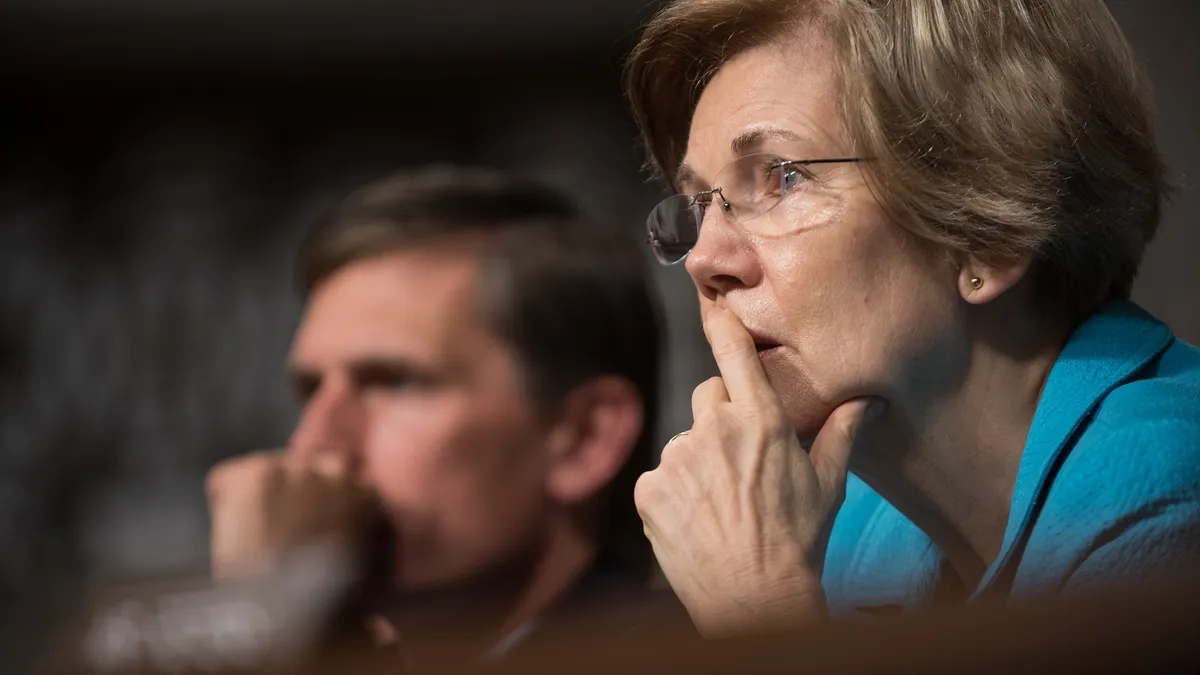Dive Brief:
- The Federal Reserve said in a statement Monday it began discussions with its inspector general’s office to launch a review of whether trading activity by senior officials — presumably, Vice Chair Richard Clarida, former Boston Fed President Eric Rosengren and outgoing Dallas Fed President Robert Kaplan — complied with the central bank’s ethics rules and the law.
- The move came hours after Sen. Elizabeth Warren, D-MA, sent a letter to Securities and Exchange Commission (SEC) Chair Gary Gensler, asking his agency to investigate whether Fed officials’ stock activity violated insider-trading rules.
- Clarida’s financial disclosures show he moved between $1 million and $5 million from a bond fund into stock funds on Feb. 27, 2020 — a day before Fed Chair Jerome Powell issued a statement signaling the Fed might cut interest rates. Bloomberg first reported on Clarida’s transactions Friday, based on disclosures released in mid-May.
Dive Insight:
The pending Fed inspector general review and call for SEC action represent a deepening of curiosity surrounding central bank officials’ interactions with financial markets at large. Kaplan and Rosengren resigned last week after financial disclosure forms revealed they traded stocks last year while also helping to set monetary policy — a practice that meets the Fed’s code of ethics but nonetheless raised concerns around potential conflicts of interest.
Kaplan disclosed he held stakes worth more than $1 million in 27 publicly traded companies, funds and alternative investments, according to the Financial Times. Rosengren listed stakes worth at least $151,000 in four real estate investment trusts.
A spokeswoman for the Fed told Bloomberg each chose to resign without pressure from the central bank’s board of governors — and, in fact, Rosengren attributed his early retirement to a worsening kidney condition. Kaplan, however, addressed the controversy head-on. “The recent focus on my financial disclosure risks becoming a distraction to the Federal Reserve’s execution of … vital work,” he said in a statement. “For that reason, I have decided to retire.”
Rosengren and Kaplan’s announced exits came a day before Powell testified in front of the Senate Banking Committee, in hearing that was slated to serve as a progress report the Fed and Treasury Department’s pandemic recovery efforts through the CARES Act.
Warren seized the opportunity to castigate Powell on his record, calling him a “dangerous man” to lead the Fed and adding she would not support his nomination for another term. Powell’s term expires in February, but President Joe Biden has said he would signal this fall whether he would renominate Powell.
Reports of Clarida, Rosengren and Kaplan’s trading activity “raise serious questions about possible conflicts of interest and reveal a disregard for the public trust,” Warren wrote in Monday’s letter to Gensler, seen by The Wall Street Journal. “They also reflect atrocious judgment by these officials, and an attitude that personal profiteering is more important than the American people’s confidence in the Fed.”
The central bank’s Voluntary Guide to Conduct for Senior Officials indicates that “an employee with knowledge” of confidential policy information “should carefully avoid engaging in any financial transaction the timing of which could create the appearance of acting on inside information concerning Federal Reserve deliberations and actions,” Bloomberg reported.
Clarida’s transactions were a “pre-planned rebalancing to his accounts … executed prior to his involvement in deliberations on Federal Reserve actions to respond to the emergence of the coronavirus and not during a blackout period,” a Fed spokesman told Bloomberg and The Wall Street Journal. “The selected funds were chosen with the prior approval of the board’s ethics official.”
The moves mirror similar transactions Clarida disclosed in 2019, the spokesman said. Clarida made five transactions last year and seven transactions in 2019 — all in mutual funds or exchange-traded funds, the disclosures show. For reference, when Kaplan and Rosengren first felt blowback over their disclosures, they pledged to move their stock holdings into diversified mutual funds.
The activity appears to be “exactly the kind of autopilot trade public officials are supposed to make,” Chris Low, chief economist at FHN Financial, told clients in a note Monday, according to The Wall Street Journal. “Unfortunately for Clarida … the timing, coincidence or not, stinks.”
Warren, in her letter, however, said, “there is no justifiable ethics or financial rationale for him or any other government official to be involved in these questionable market machinations while having access to non-public information and authority over decisions that have extraordinary impacts on markets and the economy.
“If these trades were based on Fed officials’ knowledge of non-public, market moving information, they may have represented potentially illegal activity,” she added.
It may be difficult, however, to prove insider trading if transactions are part of a scheduled program to buy and sell securities.
The Fed, in a statement Monday, said it would “welcome [the inspector general’s office] review and will accept and take appropriate actions based on its findings.”
An investigation has buy-in from a leading Republican lawmaker, too. Sen. Pat Toomey, R-PA, the banking panel’s ranking member said a probe “makes sense,” according to Bloomberg.
“It is important that the public have a very high level of confidence that no senior Fed official is engaged in creating any kind of conflict of interest,” he said.
Powell, for his part, pledged “a thorough going and comprehensive review.”
“We’re going to gather all the facts and look at ways to further tighten our rules and standards,” he said late last month. He echoed that in the hearing last week. “We understand now that we need to modify our practices, and we’re in the process of creating ideas and recommendations for that,” he said.
Norman Eisen, a senior fellow at the Brookings Institution, told The New York Times the controversy “does point, again, to the need for special Fed rules.”
“Because of the extraordinary influence of senior officials at the Fed on bond and equity markets, those questions are legitimate,” he said.
The SEC declined to comment on Warren’s letter.














